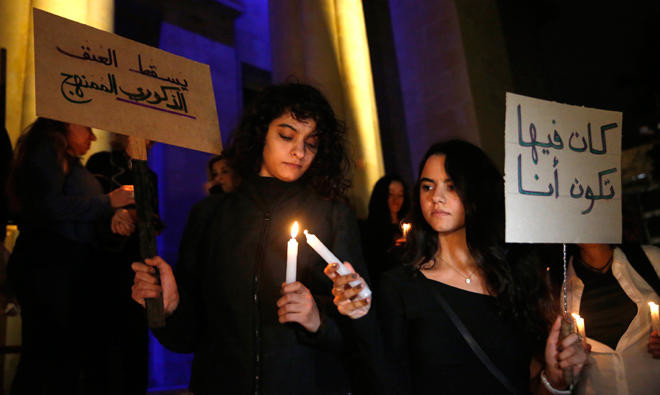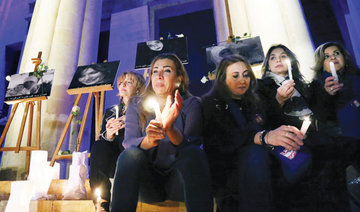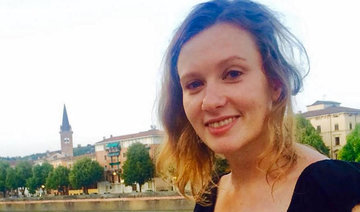LONDON: Women may be gaining ground legally, but older generations say that over time, their liberties have been chipped away.
Pictures of Levantine women in the sixties and seventies hint at fewer restrictions — their coiffured hair, short sleeves and mini skirts portraying modes of dress that would be unthinkable in modern-day Syria or Iraq.
Layla Naffa, director of projects at the Arab Women’s Organization in Jordan, started university in the late sixties when women were moving more and more into the public sphere. “We seemed to gain so many liberties back then — women were in education, attending university and able to work.”
“You can see the difference in the way they dressed and presented themselves. We all used to wear the micro-jupe (mini skirt).”
In 1974, Jordanian women received the right to vote. Prior to this, Syria was among the earliest Arab countries to take the step in 1949, followed by Lebanon in 1952 and Egypt in 1956.
Progress started to sputter in the mid-seventies, Naffa said, with the rise of Islamic extremism, which has been gaining momentum ever since.
Since then, attitudes in conservative communities have hardened against women’s rights, with many who may once have enjoyed more freedoms, shut out of public life and consigned to the domestic sphere.
Recent regional tensions have exacerbated this inequality, said Amal Amraoui of the Chouf Organization, which campaigns for women’s rights in Tunisia.
“Mentalities are going backward and the new kind of radicalization in the region kills a little bit of our freedom day by day.”
“Before women in MENA (the Middle East and North Africa) countries had freedom, but not rights; now they are getting rights but they don’t have freedom,” she added.
Recent legal reforms, including a law eliminating violence against women in Tunisia and the abolition of rape-marriage clauses in Jordan and Lebanon, are an important first step. However, these will not translate into change on the ground without simultaneously unpicking a deep-rooted mentality that sees gender-based violence as acceptable and inequality as the norm.
“Governments passing laws is one aspect, but it isn’t everything,” said Dr. Lina Abirafeh, director of the Institute for Women’s Studies in the Arab World (IWSAW).
“It is about undoing what is so ingrained in all of us we don’t even realize it... and it begins with education.”
Aid agencies say that women and girls suffer disproportionately in times of conflict and economic hardship, which often trigger an increase in sexual harassment, domestic violence and early marriage.
“Those conflicts and insecurities exacerbate the pre-existing vulnerabilities that women and girls already have. In short, they make things much worse,” Abirafeh added.
Sara Bittar, a gender research consultant who works with international NGOs, said that women in conservative communities in the Middle East are facing more and more pressure, noting a rise in child marriage and increasing rates of domestic violence, particularly among refugees.
While access to employment and education has improved for a select few, the gap between social spheres has widened, she said, cutting the vast majority adrift from these opportunities.
“If we are to look at opportunities for women across the board, they have not increased as much as you would expect, especially in light of the recent (legal) reforms as well as social media, which should give more women a voice.”
Instead, “new channels have reinforced existing restrictions,” she explained, with those in opposition to equal rights utilizing social media platforms to condemn gender equality and criticize its advocates.
Since the start of the Arab Spring in 2011, which many women used as a platform to demand their rights, violence against activists has seen a notable increase. But while opposition to gender equality remains widespread, civil society organizations have grown stronger and more vocal, raising issues in the public sphere that would once have been taboo to touch on.
But the road to comprehensive change remains long and confidence that equality is achievable ebbs and flows for activists facing hurdles that often seem insurmountable.
Women may have more rights ‘but female freedoms are going backward’
Women may have more rights ‘but female freedoms are going backward’

Egypt top diplomat meets PLO, urges Palestinian unity

The conflict began after the Palestinian militant group Hamas launched a surprise attack on Israel on October 7, 2023, triggering massive retaliation.
During his meeting with the PLO delegation in Cairo, Badr Abdelatty “reaffirmed Egypt’s supportive stance toward the Palestinian Authority,” his office said in a statement.
The minister also reiterated “Egypt’s rejection of any plans to displace Palestinians from their lands,” it added.
Last month, Egypt hosted talks between rival Palestinian groups Fatah and Hamas to discuss bringing post-war Gaza under PA control.
Fatah, which governs parts of the occupied West Bank under the PA, dominates both the PA and the PLO, an internationally recognized representative of the Palestinian people.
It has been excluded from Gaza since Hamas seized control in 2007.
On Thursday, Abdelatty also discussed with the PLO delegation Egypt’s efforts to end the Gaza war, reach a ceasefire agreement and facilitate the delivery of humanitarian aid to the Gaza Strip.
Mediators Egypt, Qatar and the United States have been engaged in months of talks to cement a truce in Gaza, but so far to no avail.
US Secretary of State Antony Blinken said on Wednesday that a Gaza ceasefire remained close but added it may not happen before President Joe Biden hands over to Donald Trump.
“I hope that we can get it over the line in the time that we have,” said Blinken, who leaves office with Trump’s inauguration on January 20.
Hamas said at the end of last week that indirect negotiations in Doha had resumed, while Israel said it had authorized negotiators to continue the talks in the Qatari capital.
A previous round of mediation in December ended with both sides blaming the other for the impasse, with Hamas accusing Israel of setting “new conditions” and Israel accusing Hamas of throwing up “obstacles” to a deal.
France congratulates new Lebanon president, calls for ‘strong government’

- French foreign ministry said Joseph Aoun's election “opens a new page" for Lebanon
PARIS: France on Thursday welcomed the election by Lebanese lawmakers of army chief Joseph Aoun as president after a two-year vacuum at the top, urging the formation of a strong government to drag the country out of a political and economic crisis.
Extending France’s “warm congratulations” to Aoun, the French foreign ministry said his election “opens a new page for the Lebanese” and urged “the appointment of a strong government” that can help the country recover.
Italian foreign minister to meet Syria's new rulers in Damascus

- Antonio Tajani said he would push Syria’s transitional government to pursue an “inclusive political process”
ROME: Italy’s Foreign Minister Antonio Tajani said Wednesday he would travel to Syria Friday where he plans to announce an initial development aid package for the country ravaged by years of war.
Tajani’s trip follows those by his French and German counterparts, who visited the Syrian capital last week to meet Syria’s new rulers after they toppled Bashar Assad's regime in a lightning offensive last month.
“It is essential to preserve territorial integrity and prevent (Syria’s) territory from being exploited by terrorist organizations and hostile actors,” Tajani told parliament.
Western powers have been cautiously hoping for greater stability in Syria, a decade after the war triggered a major refugee crisis that shook up European politics.
Tajani did not provide any details about what he called a “first package of aid for cooperation and development.”
Tajani said he would push Syria’s transitional government to pursue an “inclusive political process” that “recognizes and enhances the role of Christians as citizens with full rights.”
Ahead of his trip, Tajani is set Thursday to meet with the foreign ministers of France, Germany, Britain and the United States over the Syria situation, with the drafting of a new constitution and Syria’s economic recovery on the agenda.
The EU’s foreign affairs chief, Kaja Kallas, was expected in Rome for the meeting.
Thousands of Alawites mourn 3 killed by foreign Islamists: monitor, witness

- “Thousands of mourners gathered at the funeral of three Alawite farmers from the same family,” said the Syrian Observatory for Human Rights
- The civilians were killed on Wednesday in the village of Ain Sharqia
DAMASCUS: Thousands of Syrians from ousted President Bashar Assad’s Alawite community mourned on Thursday three civilians killed by foreign Islamist allies of the country’s new authorities, a war monitor and an attendee said.
Since Assad’s ouster, violence against Alawites, long associated with his clan, has soared, with the monitor recording at least 148 killings.
“Thousands of mourners gathered at the funeral of three Alawite farmers from the same family, including one child, killed by foreign Islamist fighters allied to Syria’s new authorities,” said the Syrian Observatory for Human Rights war monitor.
The civilians were killed on Wednesday in the village of Ain Sharqia, in the Alawite heartland of Latakia province, the Observatory said.
“Down with the factions,” some of those in attendance chanted in reference to armed groups, according to footage shared by the monitor.
Mourner Ali told AFP that people had called for those responsible for the killings to be punished and for foreign fighters to leave so that local policemen affiliated with the new authorities could take their place.
“We can’t have people die every day,” he said, asking to be identified only by his first name to discuss sensitive matters.
“We want security and safety to prevail; we support the transitional authorities. We do not want any more killings after today.”
Rami Abdel Rahman, who heads the Observatory, told AFP the mourners also demanded that Syria’s new rulers free thousands of detained soldiers and conscripts.
The Alawite community was over-represented in the country’s now-defunct armed forces.
On Tuesday, three Alawite clerics were also killed by unknown gunmen on the road from Tartus to Damascus, the monitor said.
Another cleric and his wife were found dead in the Hama countryside Thursday after they were abducted a day earlier.
Last month, angry protests broke out in Syria over a video showing an attack on an Alawite shrine, with the Observatory reporting one demonstrator killed in Homs city.
Syrian authorities said the footage was “old” and that “unknown groups” were behind the attack, saying republishing the video served to “stir up strife.”
The alliance spearheaded by the Islamist group Hayat Tahrir Al-Sham (HTS), which seized Damascus and ousted Assad on December 8 after a lightning offensive, has sought to reassure minority communities in the Sunni Muslim majority country.
Assad had long presented himself as a protector of minority groups.
Lebanon’s new president promises to rebuild what ‘Israel has destroyed’

- The Mediterranean country has been without a president since the term of Michel Aoun ended in October 2022
BEIRUT: Newly elected Lebanese president Joseph Aoun has promised to rebuild what the Israeli occupation has destroyed, in a speech before parliament after taking his oath of office.
The Lebanese state will be able to remove Israeli occupation and the effects of its aggression, Aoun said, after hurdling the second round of voting in parliament to become the country’s new president.
“I promise to reconstruct what Israel destroyed in the south and Beirut’s southern suburbs,’ he said.
The newly elected president also touched on the Palestinian issue, saying he rejects the settlement of Palestinian people and guaranteed their right to return.
He also pledged to work towards the best of relations with Arab countries, and cooperate with Syria to control the borders from both sides.
The Mediterranean country has been without a president since the term of Michel Aoun – not related – ended in October 2022, with tensions between the Iran-backed Hezbollah movement and its opponents scuppering a dozen previous votes.
During parliament’s first session on Thursday morning, 71 out of 128 lawmakers voted in favor of the army commander, short of the required 86, in the first round of the vote.
Thirty-seven members of parliament voted blank, including 30 lawmakers from the pro-Hezbollah bloc, according to a source close to it.
Twenty ballots were declared null and void.
Aoun received 99 votes during the second round, more than the minimum votes required for him to be voted into office.
But international pressure has mounted for a successful outcome with just 17 days remaining in a ceasefire to deploy Lebanese troops alongside UN peacekeepers in south Lebanon after a Hezbollah-Israel war last autumn.
Speaker Nabih Berri then suspended the session until 2:00 p.m. sparking outrage from some lawmakers who demanded an immediate second vote.
The president’s powers have been reduced since the end of the 1975-1990 civil war. But filling the position is key to overseeing consultations toward naming a new prime minister to lead a government capable of carrying out reforms demanded by international creditors.
Lebanon’s divided political elite usually agrees on a consensus candidate before any successful parliamentary vote is held.
Aoun, who will turn 61 on Friday, appears to have the backing of the United States and key regional player Saudi Arabia.
US, Saudi and French envoys have visited Beirut to increase pressure in the run-up to the vote.
Pope Francis on Thursday expressed hope that Lebanon could “possess the necessary institutional stability... to address the grave economic and social situation.”
Several lawmakers have objected to what they see as foreign interference in the vote.
In protest, some rendered their ballot void by voting for “sovereignty and the constitution,” a reference to the fact that Aoun’s election would also require a constitutional amendment.
Under Lebanon’s constitution, any presidential candidate must have not held high office for at least two years. Aoun is still head of the army, after extending his mandate past his planned retirement.
Critics have accused Hezbollah and allies of scuppering previous votes.
But a full-fledged war between Israel and Hezbollah last autumn dealt heavy blows to the Shiite militant group, including the death of its longtime leader Hassan Nasrallah in an air strike.
In neighboring Syria, Hezbollah has lost a major ally after militants toppled President Bashar Assad last month.
Under multi-confessional Lebanon’s power-sharing system, the president must be a Maronite Christian. Aoun is Lebanon’s fifth army commander to become president, and the fourth in a row.
Military chiefs too are, by convention, Maronites.
The new president faces daunting challenges, with the truce to oversee on the Israeli border and bomb-damaged neighborhoods in the south, the east and the capital to rebuild.
Since 2019, Lebanon has been gripped by the worst financial crisis in its history.
The Hezbollah-Israel war has cost Lebanon more than $5 billion in economic losses, with structural damage amounting to billions more, according to the World Bank.


















